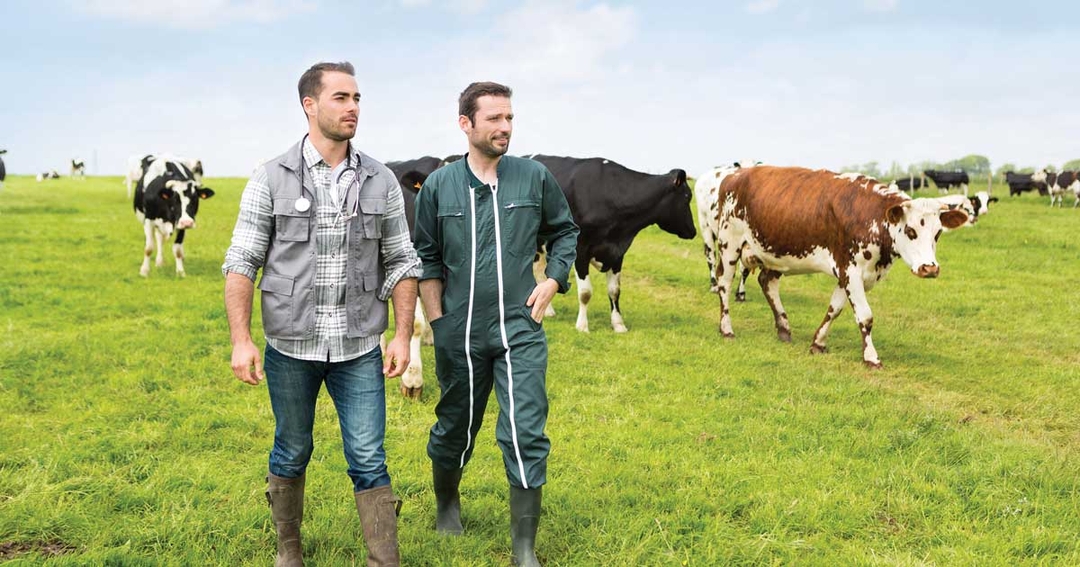27 May 2022
Stakeholders in process of launching Medicine Hub to document ruminant antibiotic data, while flagship Government programme of funded vet visits is being rolled out to farms.

Image © Production Perig / Adobe Stock
Farm vets will be key to the success of two major projects to track antibiotic use and boost herd health in livestock.
Stakeholders are in the process of launching the Medicine Hub, which will collect detailed data on the amount of antibiotics being used in cattle and sheep for the first time.
The test phase of Government-funded vet visits to farms, one of the main aspects of Defra’s flagship Animal Health and Welfare Pathway, has also started ahead of a full autumn roll-out.
Data on antibiotic use in pigs has been collected through an electronic medicine book (eMB) since 2015, with most pig producers supplying data and the sector able to show a reduction in use of more than 60%.
Its success has helped those in animal health to meet ongoing Responsible Use of Medicines in Agriculture Alliance (RUMA) targets to reduce antibiotic use and show the UK is one of the lowest users of antibiotics on farm in Europe.
But data for cattle and sheep has been more difficult to show, leading to the launch of Medicine Hub.
The data tool, described as a “safe, secure and independent central repository to collate, report and compare antibiotic use at individual farm level”, is being launched in a partnership of stakeholders, led by the Agriculture and Horticulture Development Board (AHDB).
Vet Mandy Nevel, head of animal health and welfare at AHDB, said: “We have more than 94% of slaughtered pigs on the eMB, so it is a massive data set and we are very comfortable. It is very, very good data, and it has really enabled the pig industry to defend its own reputation and to reduce antibiotics, which it needed to do.
“While the ruminants sectors are lower users of antibiotics, we know there is still a need to know what is being used and what for.
“At the end of the day, these are food animals, and we need to be accountable and we need to be able to demonstrate that, as vets, who are the guardians of antibiotic use, they are used responsibly. If you don’t know what you are using, I would argue that you can’t say you are being that responsible.”
Dr Nevel added that vets out on farm were essential to the success of the Medicine Hub project. She said: “We think vets are key to this.
“Not only because they are the guardians of antibiotic use and they need to know – they are the ones using them. It is not the farmers who should be the gatekeepers, it should very much by the vets.
“So, even if they are not uploading the data, they should be encouraging their producers, their farmers to use the Medicine Hub. So, we feel that vets are probably going to be the most important route to getting data on to the system, either directly or through encouragement of other people who can put the data on.”
In February, environment secretary George Eustice outlined details of Defra’s Animal Health and Welfare Pathway – offering financial support for the livestock sectors, including fully funded annual vet visits in England to help maintain healthier, higher welfare animals.
Visits are being rolled out in a staged process, starting with a small group of farms before progressing to larger units and full implementation to all farms in the Basic Payment Scheme in the autumn.
Vet Jonathan Statham, in his role as chair of the Animal Health and Welfare Board for England, is heading up the roll-out of the pathway visits.
He said: “What we have got here puts vets, and the vet-led team front and centre in a huge, once-in-a-generation opportunity to look at support for health and welfare changes.
“I think vets have been really central to both the design of the programmes, to understanding how their close working relationship with their farm clients is at the heart of the whole pathway, so I think it has been very positive and has shaped where we are with it to this point.”
Other organisations in the veterinary and animal health sector support, and have been involved in, both the Medicine Hub and pathway visit initiatives.
For the BCVA, board member Rachel Hayton said: “People are often very surprised when they learn we do not have a reliable figure for antibiotic use in ruminants in the UK. We have some estimates published by VMD, based on some representative samples; these samples are quite large in the case of dairy farms, but smaller in the case of beef and sheep.
“Anecdotally, we think there is a good news story to tell, but we cannot yet tell it convincingly.
“Vets are an important route for uploading data to Medicine Hub. Not only are they holders of antibiotic sales data, but they already carry out reviews of antibiotic use with their clients, in many cases as a requirement of farm assurance schemes.”
Phil Stocker, of the National Sheep Association, said: “It’s in all our interests to collect this data to showcase and demonstrate our responsible use of antibiotics.
“We have felt for a long time that we can’t monitor if we can’t measure. Vets can play a key part in encouraging their clients to upload their information – or give permission for the vet practice to upload it on their behalf.
“In England, the Animal Health and Welfare Pathway should be a real catalyst for collecting more data, while the vet and the farmer are working on an annual health and welfare review.”